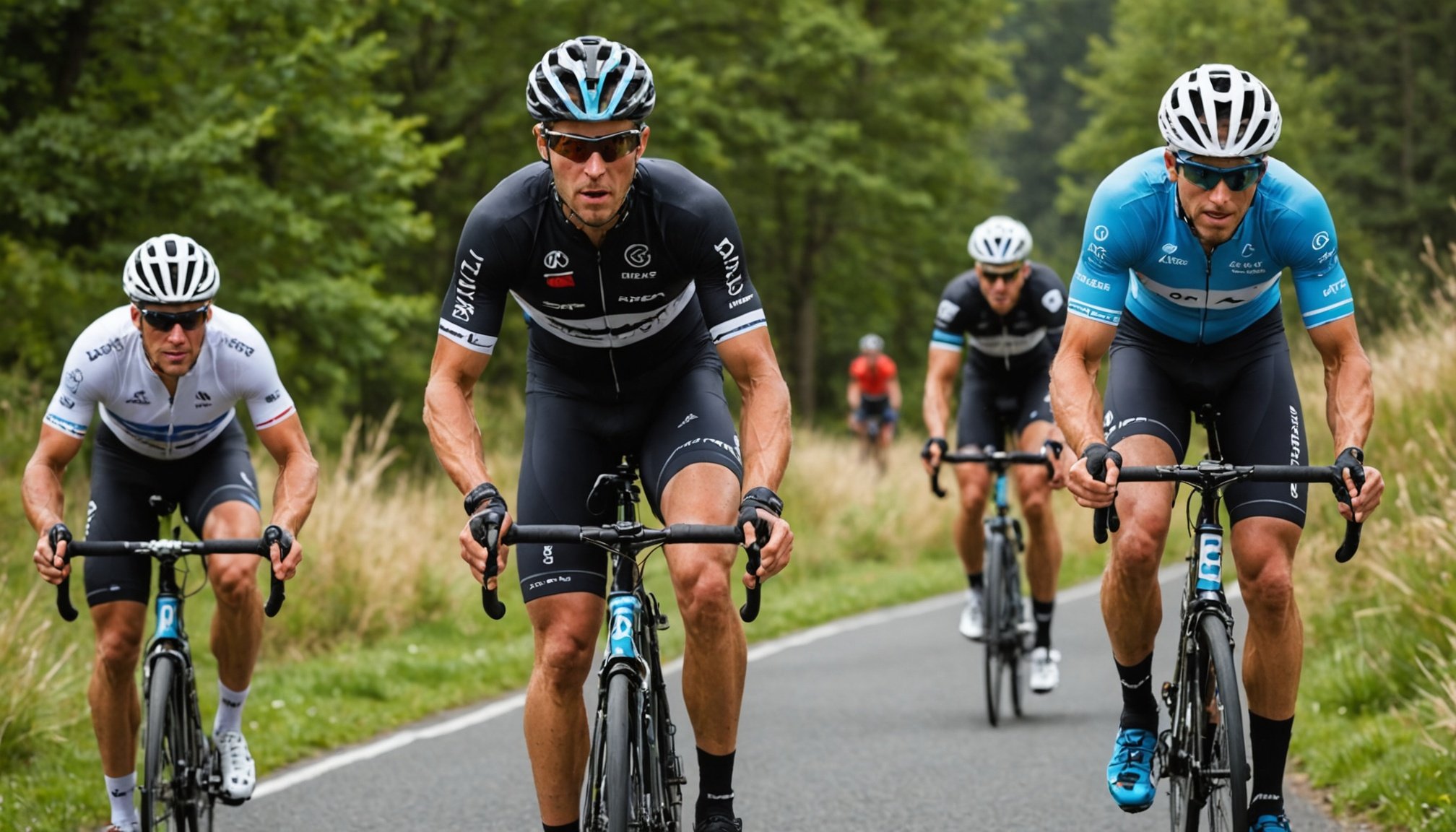Mastering Carbohydrate Strategies: A Cyclist’s Guide to Peak Performance Nutrition
When it comes to cycling, particularly at the competitive or endurance levels, nutrition plays a crucial role in achieving peak performance. Among the various nutritional components, carbohydrates are perhaps the most critical for cyclists, as they serve as the primary source of energy for the body. Here’s a comprehensive guide to help cyclists understand and master carbohydrate strategies for optimal performance.
Understanding Carbohydrates and Their Role in Cycling
Carbohydrates are the body’s preferred source of energy, especially during high-intensity and endurance activities like cycling. Here’s why they are so important:
This might interest you : Unlocking Superior Flexibility: Top Strategies for Enhancing Mobility in Gymnasts
Glycogen Stores and Energy Levels
Glycogen, a complex carbohydrate stored in the muscles and liver, is the body’s primary energy reserve. When you cycle, your body first uses glycogen for energy. However, these stores are limited and can be depleted after prolonged or intense exercise. For instance, during a marathon or a long-distance cycling event, maintaining high glycogen levels is essential to prevent fatigue and ensure consistent performance[1].
Types of Carbohydrates
Carbohydrates come in two main forms: simple and complex. Simple carbohydrates, such as sugars, are quickly digested and provide rapid energy. Complex carbohydrates, found in foods like whole grains, fruits, and vegetables, take longer to digest and offer sustained energy levels.
Also to see : Maximizing Off-Season Success: Essential Training Adjustments for Tennis Players
Pre-Exercise Carbohydrate Intake
Before a cycling session, especially one that is intense or prolonged, it is crucial to ensure you have adequate carbohydrate intake to maintain high glycogen stores.
Recommended Carbohydrate Intake
Experts from the Academy of Nutrition and Dietetics, Dietitians of Canada, and the American College of Sports Medicine recommend consuming sufficient carbohydrates before exercise. For example, a cyclist might consume 6-8 grams of carbohydrates per kilogram of body weight in the 1-3 hours leading up to the exercise. This could be achieved through a balanced meal that includes complex carbohydrates like whole grain bread, pasta, or oatmeal, along with some simple carbohydrates for quick energy[1].
Example Meal
- Breakfast: Oatmeal with banana, honey, and a glass of orange juice.
- 1 cup oatmeal: 30 grams carbs
- 1 banana: 20 grams carbs
- 1 tbsp honey: 17 grams carbs
- 1 glass orange juice: 30 grams carbs
Total: 97 grams carbs
During Exercise Carbohydrate Strategies
During long cycling events, maintaining energy levels is critical. Here are some strategies to keep in mind:
Carb Loading and Intake During Exercise
For events lasting more than 60-90 minutes, consuming carbohydrates during the exercise can help maintain glycogen stores and energy levels. Cyclists can consume 80-85 grams of carbohydrates per hour, which can be achieved through sports drinks, energy gels, or solid foods like energy bars and fruits[3].
Table: Carbohydrate Intake During Exercise
| Duration of Exercise | Recommended Carbohydrate Intake | Examples |
|---|---|---|
| 60-90 minutes | 30-60 grams/hour | Energy gel, sports drink |
| 90-120 minutes | 60-80 grams/hour | Energy bar, banana |
| >120 minutes | 80-85 grams/hour | Combination of energy gels, sports drinks, and solid foods |
Post-Exercise Recovery and Carbohydrate Intake
After a cycling session, particularly one that is intense or prolonged, recovery is crucial to replenish glycogen stores and aid in muscle recovery.
Immediate Post-Exercise Nutrition
Within 30-60 minutes after exercise, it is essential to consume a mix of carbohydrates and protein to help restore glycogen stores and support muscle recovery. A ratio of 3:1 or 4:1 (carbohydrates:protein) is often recommended. For example:
- Post-Exercise Meal: Smoothie with banana, yogurt, and honey.
- 1 banana: 20 grams carbs
- 1 cup yogurt: 30 grams carbs, 10 grams protein
- 1 tbsp honey: 17 grams carbs
Total: 67 grams carbs, 10 grams protein[1].
Importance of Glycogen Replenishment
“Glycogen replenishment is essential for preparing the muscles for the next training session or event,” notes a nutrition expert. “Without adequate glycogen stores, performance can suffer significantly, and the risk of fatigue and injury increases”[1].
Carb Cycling and Periodization
Carb cycling and periodization involve varying carbohydrate intake to match the intensity and duration of training sessions. Here’s how it works:
High Carb Days
During high-intensity or long training days, increase carbohydrate intake to ensure adequate energy levels. For example, if you have a 3-hour cycling session planned, you might consume a higher amount of carbohydrates in the meal before and during the exercise.
Low Carb Days
On low-intensity or rest days, you can reduce carbohydrate intake. This helps in adapting the body to use fat as an energy source, which can be beneficial for endurance activities.
Example of Carb Cycling
- High Carb Day: 300-400 grams of carbs (e.g., before and during a long cycling event)
- Low Carb Day: 100-150 grams of carbs (e.g., on a rest day or light training day)
Risks and Considerations of Low Carb or Fasting Training
While some cyclists explore low-carb or fasting training to enhance fat metabolism, there are significant risks to consider:
Depletion of Glycogen Stores
Training on low glycogen stores can lead to decreased performance and increased risk of muscle damage. “When glycogen stores are low, the body may start breaking down muscle proteins for energy, which can result in muscle loss over time,” warns a sports nutritionist[1].
List: Risks of Low Carb or Fasting Training
- Decreased Performance: Reduced glycogen stores can lead to fatigue and decreased performance.
- Muscle Damage: The body may use muscle proteins for energy, leading to muscle loss.
- Increased Risk of Injury: Low energy levels can impair physical performance and increase the risk of injury.
- Lack of Scientific Evidence: There is limited scientific evidence to support the long-term benefits of low-carb or fasting training for most athletes.
Personalized Nutrition Plans
Every cyclist is different, with unique nutritional needs based on their body composition, fitness goals, and training schedule. Here’s why a personalized plan is essential:
Consult a Sports Nutritionist
A sports nutritionist can help you develop a tailored nutrition plan that aligns with your specific needs and goals. “A personalized approach ensures that you are fueling your body optimally for peak performance and recovery,” advises a sports nutrition expert[1].
Mastering carbohydrate strategies is crucial for cyclists aiming to achieve peak performance. By understanding the role of carbohydrates in energy production, planning pre-exercise meals, managing carbohydrate intake during exercise, and focusing on post-exercise recovery, cyclists can optimize their nutrition to enhance endurance, performance, and overall fitness goals.
Final Tips for Cyclists
- Listen to Your Body: Pay attention to how your body responds to different carbohydrate strategies.
- Stay Hydrated: Adequate hydration is as important as carbohydrate intake for maintaining performance.
- Experiment and Adjust: Find what works best for you through trial and error, and adjust your plan accordingly.
- Seek Professional Advice: Consult with a sports nutritionist to get a personalized nutrition plan.
By following these guidelines and staying informed about the latest in sports nutrition, cyclists can ensure they are fueling their bodies for peak performance and achieving their fitness goals.
Scientific Insights on Carbohydrates and Performance
Understanding the impact of sports nutrition is crucial for anyone invested in athletic endeavours. Current carbohydrate research reveals some compelling findings about their role in performance enhancement. A key takeaway from recent studies is the positive correlation between carbohydrate intake and improved athletic performance, specifically in activities like endurance running and cycling. Carbohydrates are known to provide a primary energy source called glycogen, which fuels muscles during prolonged exercise.
Different types of carbohydrates can have varying effects on endurance and strength. For example, whereas simple carbohydrates offer a quick source of energy, complex carbohydrates provide a more sustained release, potentially improving endurance performance. Therefore, balancing these types can be critical in sports nutrition to maximise performance.
Despite these benefits, several myths and misconceptions persist, particularly in the realm of cycling. Some athletes mistakenly believe that limiting carbohydrates can increase endurance levels— a belief that research does not support. It’s essential to base training diets on scientific findings rather than myths, as a well-planned carbohydrate strategy can be a comprehensive solution to enhancing athletic performance.











